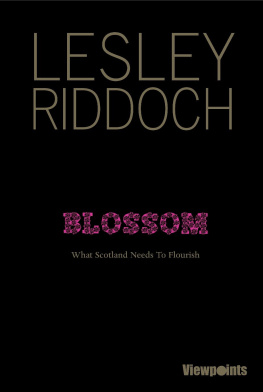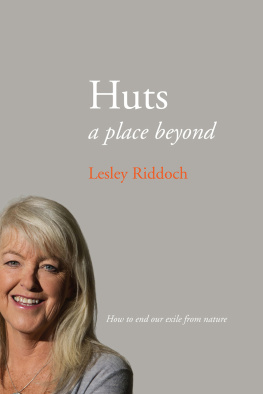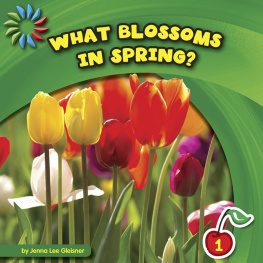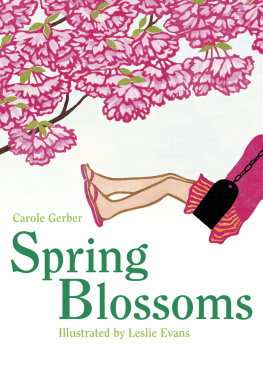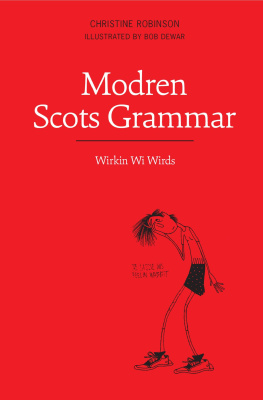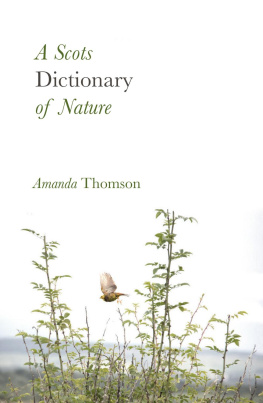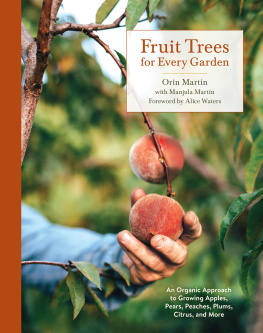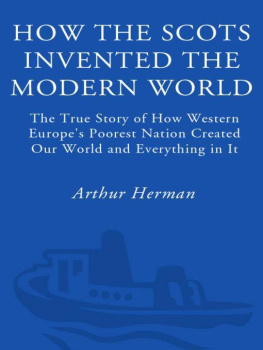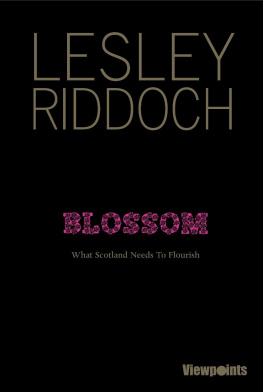LESLEY RIDDOCH is an award-winning broadcaster, writer and journalist. She writes weekly columns for The Scotsman and Sunday Post and is a regular contributor to The Guardian , Newsnight Scotland and Scotland Tonight . She is founder and Director of Nordic Horizons, a policy group that brings Nordic experts into the Scottish Parliament.
Lesley presented You and Yours on BBC Radio 4, The Midnight Hour on BBC2 and The Peoples Parliament and Powerhouse on Channel 4. She founded the Scottish feminist magazine Harpies and Quines , won two Sony awards for her daily Radio Scotland show and edited The Scotswoman a 1995 edition of The Scotsman written and edited by its female staff. She lives in Fife and is married to an Englishman who grew up in Canada.
Luath Press is an independently owned and managed book publishing company based in Scotland and is not aligned to any political party or grouping. Viewpoints is an occasional series exploring issues of current and future relevance.
Blossom
What Scotland Needs To Flourish
LESLEY RIDDOCH

Luath Press Limited
EDINBURGH
www.luath.co.uk
First published 2013
ISBN (print) : 978-1-9083736-69-4
ISBN (eBook): 978-1-909912-45-8
The authors right to be identified as author of this work under the Copyright, Designs and Patents Act 1988 has been asserted.
Lesley Riddoch
Dedicated to Chris Smith my constant support.
Contents
Acknowledgements
Muriel Alcorn
Bella Caledonia
ivind Bratberg
Paddy Bort
Professor David McCrone
Hannah Derbyshire
Development Trusts Association Scotland
Prof Tom Devine
Foster Evans
Maggie Fyffe
Jim Harvey
Mary Hepburn
Luath Press, Kirsten Graham and Louise Hutcheson
Cathy McCormack
Prof Catriona MacDonald
Rosemarie MacEachen
Cailean MacLean
Robin McAlpine
Prof Charles McKean
Mark Perryman
Perspectives magazine, especially Davie Laing
Tommy Riley
Mona Rhne
The Scotsman
Tore Tanum
Ann Soutar
Phil Welsh
Andy Wightman
Raymond Young
All the above have saved me from errors in fields where they are expert and the faults or misjudgements that survive their amendments are mine alone.
Introduction
IDENTITY OR BAGGAGE? Scotland is currently on a quest for one, weighed down by the other. Can independence resolve long- standing problems and create fresh momentum for change? Certainly a new home, job or even a divorce can improve a bad situation all on its own. Sometimes though, a change of circumstance just shifts old problems to pastures new unpacked baggage and all. Nations are no different.
This book suggests a change of constitutional control will not be enough to transform Scotland. Thats not meant to be gloomy or defeatist its actually a vote of confidence in the capacity of Scots to handle more power in real, reinvigorated communities than any politicians are currently offering.
Social inequality clashes with every idea Scots have about themselves and yet its accepted as normal together with top-down governance, weak local democracy, disempowerment, bad health and sporting estates the size of small countries. Of course Scotland also boasts the Tartan Army, whisky exports, a social democratic consensus, Andy Murray, a wheen of best-selling authors, stunning scenery and energy resources. Life is great for some and not at all bad for others so we turn away from an inconvenient truth.
In international terms, Scotland is more often exceptional for all the wrong reasons.
We have sub-east European health outcomes, ghettoes of near unemployable people, an indoors culture and high rates of addiction and self harming behaviour. Scotland also has the smallest number of people owning the largest amounts of land, the lowest proportion standing for election and the largest local authorities with the least genuinely local control of tax and resources in Europe. We have one of the biggest income gaps between rich and poor. And although no-one has done the research, Id also guess we have the least outdoorsy population, the smallest number of boat owners per mile of coastline and a high number of children who arent sure eggs come from hens. But arguably we also have the most popular cities, varied landscape, magnificent scenery, valuable energy resources, richest inventive tradition and most diverse linguistic heritage in the UK .
So is Scotlands enduring ability to punch beneath its weight caused by our lack of statehood or is it the other way around?
I appreciate that is not the way those closely involved with the independence referendum would frame the question. I was brought up in Belfast during the Troubles when even a Buddhist was asked, Aye, but are you a Catholic or a Protestant?
And yet without structural change this misunderstood, unequal, stoic and feisty country may be much the same for generations, regardless of the referendum outcome. The gardener may have a wider range of tools available but fundamentals like soil, fertility, aspect and shelter will remain unchanged. Perhaps these structural problems need more attention than the contents of the garden shed.
We already have the means to tackle social inequality. But over half a century, relative poverty has hardly shifted, 1,000 people own 60 per cent of Scottish land and voter turnout is at an all-time low.
I think deep down, Scots know its time to stop celebrating just because we occasionally sit a performance point above England at the bottom of almost every international health and wellbeing league table. Weve been badly served by political debate which is often sloganeering, simplistic and scaremongering and by a media which has become a collective echo chamber for suspicion, pessimism and despair.
There is a way out for Scotland a way for this country to truly blossom. But it needs us to question what we currently regard as normal and inevitable. And that, by definition, is very hard.
Our working knowledge of the way other countries operate is limited. Likewise our real understanding of how the other half lives in Scotland itself. So we cant believe inequality can really cause the shameful, premature mortality of the Scottish Effect. We cant imagine having a wee bit of land, or a forest hut for weekend escapes. We cant conceive that a shift of investment from later life to early years could improve Scotlands social problems within a generation. We cant visualise a country where young people come first, good health is not delivered by doctors or guaranteed by the presence of a nearby A&E department, speculators arent allowed to push up housing prices and genuine communities raise taxes and run their own services. We cant envisage how life and democracy would be improved if Scotland hit the North European average of 70 per cent turnout at local elections not nearly bottom with 38 per cent.
People cant imagine what theyve never experienced. Most decision-making Scots simply havent experienced life in healthier nations abroad or life on benefits here in the large housing estates Billy Connolly once called deserts wi windaes. Nor have most Scots seen how some of these hopeless communities have created change against all the odds. Or felt the pain personally when enthusiastic pioneers have been beaten by the system.
This is not to blame anyone. Social segregation means we almost all live in ghettos quite unaware of how other people live across the great divides of class, gender, geography, occupation and sometimes religion. Successive generations have picked up fragments of Scottish history from John Prebble, films and libraries not school. And international comparisons have always followed blood ties and emigration patterns to distant English-speaking nations larger than our own instead of successful, like-sized neighbours.

